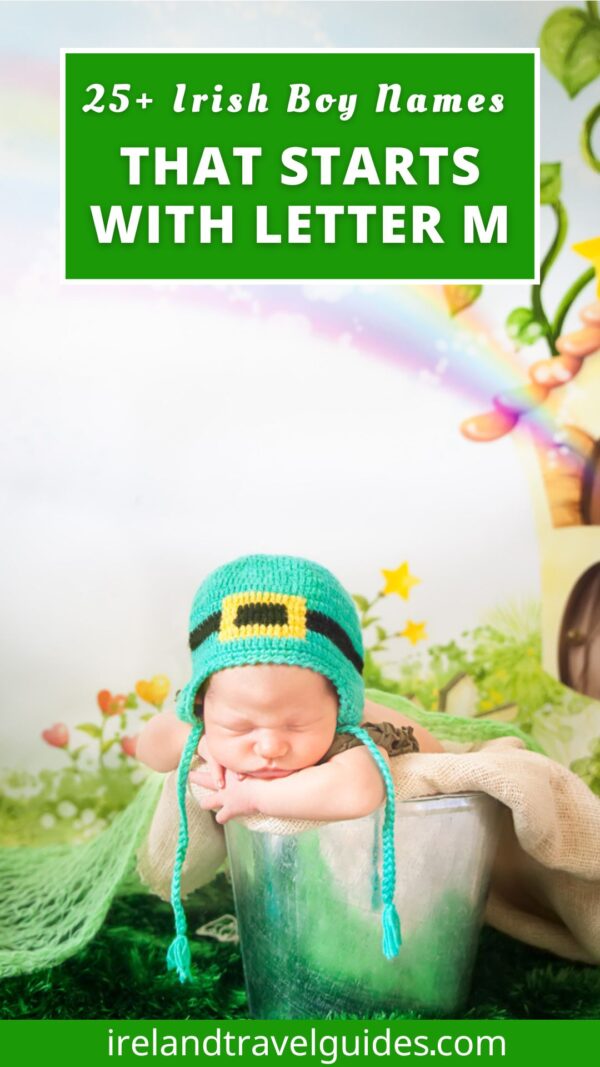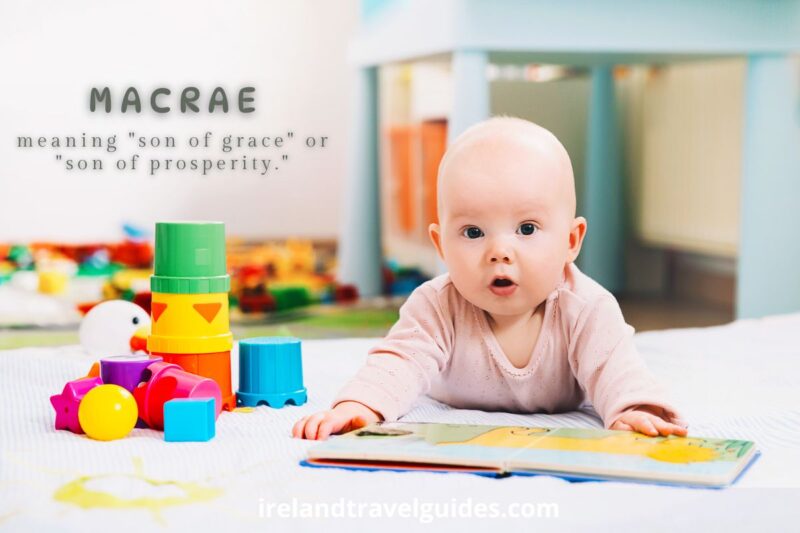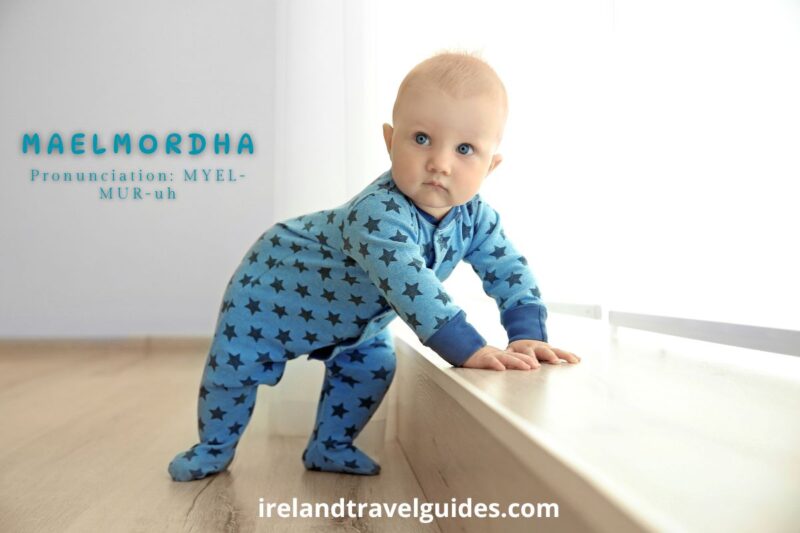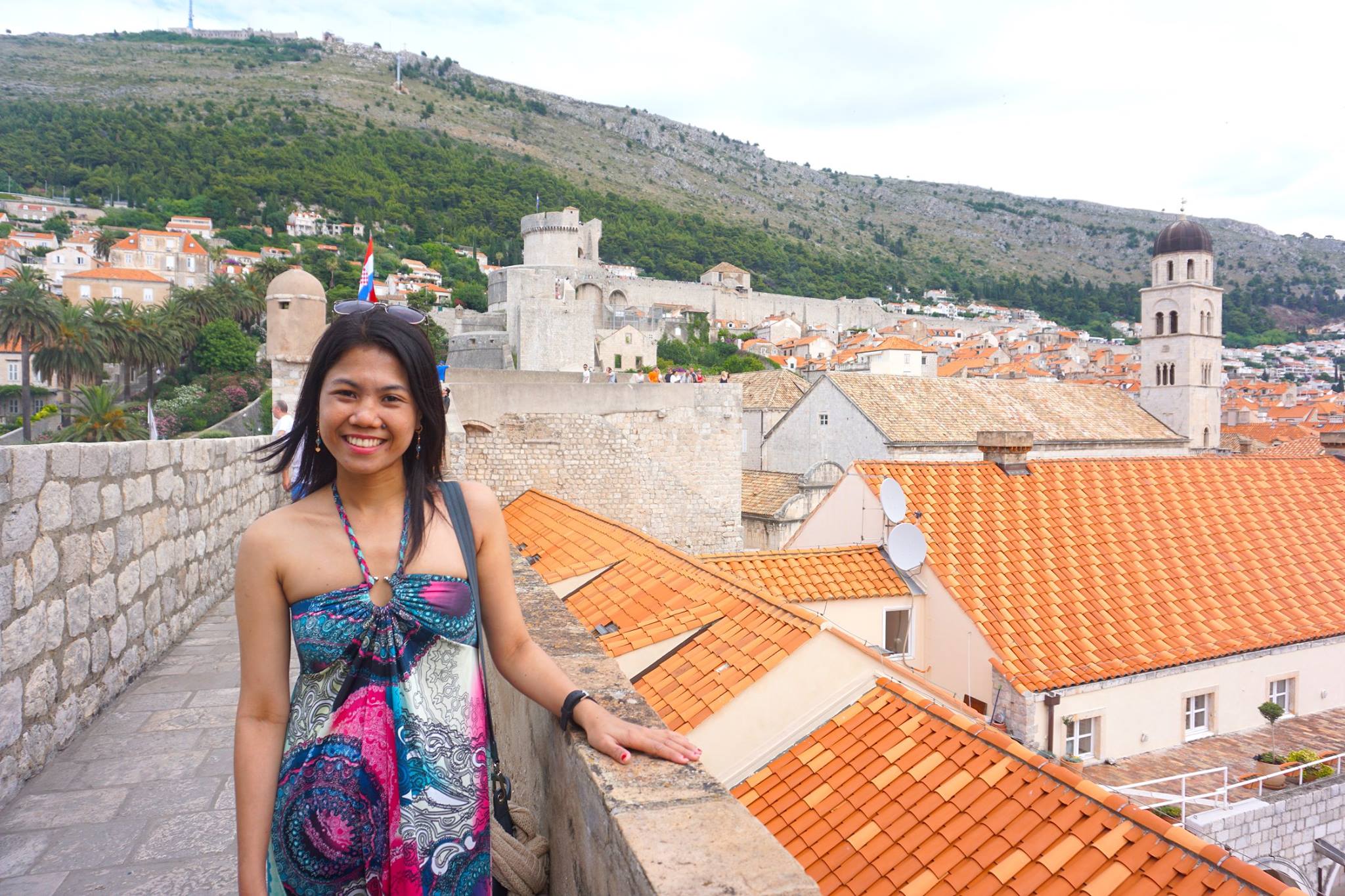Irish names are steeped in rich history, myth, and tradition, reflecting the cultural tapestry of the Emerald Isle. From the lyrical sounds of Gaelic to the deep-rooted connections with saints and warriors, Irish names have captured the imagination of people around the world.
Each name carries its own story, evoking images of rolling green hills, ancient legends, and resilient spirit. In this exploration of Irish boy names, we delve into the vast array of choices that begin with the letter “M” and uncover why these names hold a special place in the hearts of many.
50+ Irish Boy Names Starting with “M”

Related Read:
Among the treasure trove of Irish boy names, those that begin with “M” stand out for their melodic cadence and profound meanings.
From the timeless classics to the more contemporary choices, Irish names starting with “M” have garnered popularity for several reasons. Firstly, many of these names have deep roots in Gaelic tradition, connecting individuals to Ireland’s rich cultural heritage.
Secondly, their associations with saints, mythological figures, and historical heroes add layers of significance, bestowing upon bearers a sense of pride and identity.
Additionally, the unique spellings and sounds of these names lend them an air of distinction, making them memorable and charming to both Irish natives and those abroad.
Whether it’s the strong and noble “Malachy” or the spirited “Maeve,” Irish boy names starting with “M” offer a diverse range of options that resonate with both tradition and modernity.
In the following article, we uncover the meanings, origins, and enduring appeal of these captivating names, inviting readers to embark on a journey through the cultural landscape of Ireland.
Here’s a list of the meanings, background/history, and pronunciation of the 50 Irish boy names that start with “M”:
Malachy
Meaning: Derived from the Gaelic “Maolmhaodhog,” meaning “servant of Saint Maolmhaodhog.”
Background/History: Saint Maolmhaodhog was a 6th-century Irish saint.
Pronunciation: MAL-uh-kee
Murphy
Meaning: Originating from the Gaelic “Ó Murchadha,” meaning “descendant of Murchadh,” where “Murchadh” means “sea warrior.”
Background/History: It is a popular surname in Ireland.
Pronunciation: MUR-fee
Maeve
Meaning: While traditionally a girl’s name, “Maeve” has been used for boys as well. In Irish mythology, Queen Maeve (or Medb) was a powerful and ambitious warrior queen of Connacht.
Background/History: Maeve is a prominent figure in Irish mythology, known for her strength and leadership.
Pronunciation: MAYV
Mannix
Meaning: Derived from the Irish surname “Ó Mainnighe,” meaning “monk.”
Background/History: It has connections to Saint Manchán of Lemanaghan, an early Irish saint.
Pronunciation: MAN-iks
Muircheartach
Meaning: Pronounced as “MUR-khart-ah,” this ancient Gaelic name means “mariner” or “navigator of the sea.”
Background/History: Muircheartach was a common name among ancient Irish kings and warriors.
Pronunciation: MUR-khart-ah
Malcolm
Meaning: While more commonly associated with Scottish origin, “Malcolm” has Celtic roots and variations in Irish, meaning “disciple of Saint Columba.”
Background/History: It has been used by various Scottish and Irish clans.
Pronunciation: MAL-kum
Mick
Meaning:A diminutive of Michael, “Mick” is a casual and friendly name often associated with Irish culture.
Background/History: It is a common nickname in Ireland for individuals named Michael.
Pronunciation: MIK
Miles
Meaning: Derived from the Old Germanic name “Milo,” “Miles” has been used in Ireland and carries the meaning of “merciful” or “soldier.”
Background/History: It has been used by various historical figures and literary characters.
Pronunciation: MY-əlz
Maitiú
Meaning: The Irish form of “Matthew,” meaning “gift of God.”
Background/History: It has been a popular name in Ireland for centuries.
Pronunciation: MAH-tyoo
Murtagh
Meaning: Derived from the Irish name “Muirchertach,” meaning “mariner” or “navigator.”
Background/History: It was a common name among ancient Irish kings and warriors.
Pronunciation: MUR-tah
Check out these articles for more Irish Boy Names:

Malachi
Meaning: Derived from the Hebrew name “Malakhi,” meaning “my messenger” or “my angel.”
Background/History: Malachi is also a prophet in the Old Testament.
Pronunciation: MAL-uh-kai
Manus
Meaning: Derived from the Irish name “Magnus,” meaning “great” or “mighty.”
Background/History: Manus has historical associations with various Irish clans and families.
Pronunciation: MAN-us
Macsen
Meaning: A Welsh name derived from the Roman name “Maximus,” meaning “greatest” or “largest.”
Background/History: It has been used in Ireland due to historical connections between Wales and Ireland.
Pronunciation: MAK-sen
Moss
Meaning: Derived from the Old English word “mos,” meaning “peat bog” or “swampy land.”
Background/History: Moss is also a nature-inspired surname and first name.
Pronunciation: MAWS
Mortimer
Meaning: Derived from the Old French name “Mortemer,” meaning “dead sea” or “death lake.”
Background/History: Mortimer has been used as both a surname and a given name, particularly in English-speaking countries.
Pronunciation: MOR-ti-mer
Myles
Meaning: Variant of “Miles,” derived from the Old Germanic name “Milo,” meaning “merciful” or “soldier.”
Background/History: Myles has been a popular name in Ireland and other English-speaking countries.
Pronunciation: MY-əlz
Melvin
Meaning: Derived from the Old English name “Mælwine,” meaning “friend of the council” or “council protector.”
Background/History: Melvin has been used as both a surname and a given name in English-speaking countries.
Pronunciation: MEL-vin
Macdara
Meaning: Derived from the Gaelic elements “mac” meaning “son” and “Dara” meaning “oak tree” or “wise.”
Background/History: Macdara is associated with Saint Macdara, an Irish saint.
Pronunciation: MAK-dar-uh
Macauley
Meaning: Derived from the Gaelic “Mac Amhlaoibh,” meaning “son of Amhlaoibh.”
Background/History: Macauley is a surname of Scottish and Irish origin.
Pronunciation: Muh-KAW-lee
Maon
Meaning: Derived from the Old Irish word “maon,” meaning “wealth” or “treasure.”
Background/History: Maon was the name of several characters in Irish mythology.
Pronunciation: MAYN
Mainchin
Meaning: Derived from the Gaelic name “Manachán,” meaning “little monk.”
Background/History: Mainchin is associated with Saint Manchán of Lemanaghan, an early Irish saint.
Pronunciation: MAN-kin
Macallan
Meaning: Derived from the Gaelic “Mac Cathmhaoil,” meaning “son of the battle chief” or “son of the church.”
Background/History: Macallan is a surname of Scottish and Irish origin.
Pronunciation: mak-AL-uhn
Macartan
Meaning: Derived from the Gaelic “Mac Cártháin,” meaning “son of Cárthán.”
Background/History: Saint Macartan was a disciple of Saint Patrick and a bishop of Clogher in Ireland.
Pronunciation: mak-AHR-tahn
Maitias
Meaning: Variant of “Matthew,” meaning “gift of God.”
Background/History: Maitias is a variation of the popular biblical name Matthew, often used in Ireland.
Pronunciation: mah-TEE-uhs
Matheson
Meaning: Derived from the Scottish Gaelic “Mac Mhathain,” meaning “son of Matthew.”
Background/History: Matheson is a surname of Scottish and Irish origin.
Pronunciation: MATH-uh-suhn
Moriarty
Meaning: Derived from the Irish surname “Ó Muircheartaigh,” meaning “descendant of Muircheartach.”
Background/History: Moriarty is a well-known surname in Ireland, made famous by the character Professor James Moriarty in Sherlock Holmes stories.
Pronunciation: mor-ee-AR-tee
Midir
Meaning: In Irish mythology, Midir is a figure associated with the Tuatha Dé Danann, known for his role in various myths and legends.
Background/History: Midir is a prominent character in Irish mythology, often associated with love and magic.
Pronunciation: MID-ir
Mervyn
Meaning: Derived from the Welsh name “Myrddin,” meaning “sea hill” or “sea fortress.”
Background/History: Mervyn is a name of Welsh origin but has been used in Ireland and other English-speaking countries.
Pronunciation: MUR-vin
Murdock
Meaning: Derived from the Irish name “Muircheartaigh,” meaning “navigator” or “sea warrior.”
Background/History: Murdock is a variant spelling of Murdoch, a surname of Scottish and Irish origin.
Pronunciation: MUR-dok
Melchior
Meaning: Derived from the Hebrew name “Melchior,” meaning “king of light” or “my king is light.”
Background/History: Melchior is one of the traditional names of the Three Wise Men in Christian tradition.
Pronunciation: MEL-kee-or

Are you looking for more popular first names for your baby? Check out our popular lists of Irish names:
Macrae
Meaning: Derived from the Scottish Gaelic “Mac Rath,” meaning “son of grace” or “son of prosperity.”
Background/History: Macrae is a surname of Scottish and Irish origin, often associated with clans in Scotland.
Pronunciation: mah-KRAY
Maelruain
Meaning: Derived from the Gaelic elements “mael” meaning “bald” or “tonsured” and “Ruain,” possibly meaning “red” or “ruddy.”
Background/History: Maelruain was the name of several early Irish saints.
Pronunciation: MYEL-roo-in
Macgill
Meaning: Derived from the Gaelic “Mac an Ghaill,” meaning “son of the foreigner” or “son of the stranger.”
Background/History: Macgill is a surname of Scottish and Irish origin, often anglicized from Mac an Ghall.
Pronunciation: muh-GIL
Mcgowan
Meaning: Derived from the Gaelic “Mac Gobhann,” meaning “son of the smith” or “son of the metalworker.”
Background/History: Mcgowan is a surname of Scottish and Irish origin, common among families with ties to metalworking.
Pronunciation: mə-GOW-ən
Monahan
Meaning: Derived from the Irish surname “Ó Manacháin,” meaning “descendant of the monk.”
Background/History: Monahan is a surname of Irish origin, associated with families from County Monaghan.
Pronunciation: MOH-nə-han
Montague
Meaning: Derived from the French surname “Montagu,” meaning “pointed mountain” or “sharp peak.”
Background/History: Montague is a surname of Norman origin, introduced to Ireland and England after the Norman Conquest.
Pronunciation: MAHN-tuh-gyoo
Macnair
Meaning: Derived from the Gaelic “Mac an Fhaoir,” meaning “son of the noble” or “son of the worthy.”
Background/History: Macnair is a surname of Scottish and Irish origin, often anglicized from Mac an Fhir.
Pronunciation: muh-NAYR
Mullan
Meaning: Derived from the Irish surname “Ó Maoláin,” meaning “descendant of Maolán,” where “Maolán” is a diminutive of “maol,” meaning “bald” or “tonsured.”
Background/History: Mullan is a surname of Irish origin, common among families from County Tyrone and County Donegal.
Pronunciation: MUL-ən
Madden
Meaning: Derived from the Irish surname “Ó Madáin,” meaning “descendant of Madán,” where “Madán” is a diminutive of “madadh,” meaning “dog.”
Background/History: Madden is a surname of Irish origin, associated with families from County Galway and County Mayo.
Pronunciation: MAD-ən
Mulligan
Meaning: Derived from the Irish surname “Ó Maolagáin,” meaning “descendant of Maolagán,” where “Maolagán” is a diminutive of “maol,” meaning “bald” or “tonsured.”
Background/History: Mulligan is a surname of Irish origin, common among families from County Cavan and County Leitrim.
Pronunciation: muh-LIG-ən
Mullach
Meaning: Derived from the Irish word “mullach,” meaning “summit,” “peak,” or “top.”
Background/History: Mullach is often used in place names in Ireland to denote a prominent geographical feature.
Pronunciation: MUL-ukh
Maddox
Meaning: Derived from the Welsh surname “Madoc,” meaning “fortunate” or “blessed.”
Background/History: Maddox has been used as both a surname and a given name, particularly in Wales and Ireland.
Pronunciation: MAD-oks
Murchadh
Meaning: Derived from the Gaelic word “murchadh,” meaning “sea warrior” or “mariner.”
Background/History: Murchadh was a common name among ancient Irish kings and warriors.
Pronunciation: MUR-kha
Macneill
Meaning: Derived from the Gaelic “Mac Néill,” meaning “son of Niall.”
Background/History: Macneill is a surname of Irish and Scottish origin, often anglicized from Mac Néill or Mac Néill Buidhe.
Pronunciation: mak-NEEL
Molloy
Meaning: Derived from the Irish surname “Ó Maolmhuaidh,” meaning “descendant of Maolmhuadh,” where “Maolmhuadh” is a compound of “maol,” meaning “bald” or “tonsure,” and “muadh,” meaning “noble.”
Background/History: Molloy is a surname of Irish origin, associated with families from County Offaly and County Laois.
Pronunciation: MOL-oi
Martyn
Meaning: Derived from the Latin name “Martinus,” meaning “of Mars” or “warlike.”
Background/History: Martyn is a variation of the popular name Martin, often used in Ireland and other English-speaking countries.
Pronunciation: MAHR-tin
Magnus
Meaning: Derived from the Latin word “magnus,” meaning “great” or “large.”
Background/History: Magnus has been used as both a given name and a surname in various European countries, including Ireland.
Pronunciation: MAG-nuhs
Mel
Meaning: Derived from the Greek name “Melampus,” meaning “careful” or “cautious.”
Background/History: Mel has been used as both a given name and a nickname in various cultures, including Ireland.
Pronunciation: MEL
Mael
Meaning: Derived from the Gaelic “mael,” meaning “bald” or “tonsure.”
Background/History: Mael is often used as a prefix in Irish names, indicating a tonsured or monk-like appearance.
Pronunciation: MYEL
Machaon
Meaning: In Irish mythology, Machaon was a legendary figure, associated with healing and medicine. The name itself may derive from the Greek figure Machaon, a hero of the Trojan War known for his medical skills.
Background/History: Machaon appears in Irish mythology as a healer and physician, often associated with the Tuatha Dé Danann.
Pronunciation: MAH-kay-on
Madoc
Meaning: Derived from the Welsh name “Madog,” meaning “fortunate” or “blessed.”
Background/History: Madoc ap Owain Gwynedd was a legendary Welsh prince who, according to folklore, discovered America in the 12th century.
Pronunciation: MAD-ək
Malin
Meaning: Derived from the Gaelic “Maolán,” a diminutive of “maol,” meaning “bald” or “tonsure.”
Background/History: Malin is also the name of several places in Ireland and Sweden, adding geographical significance.
Pronunciation: MAH-lin

Maelmordha
Meaning: Derived from the Gaelic elements “mael” meaning “bald” or “tonsured” and “mordha” meaning “noble” or “proud.”
Background/History: Maelmordha was the name of several notable figures in Irish history and mythology.
Pronunciation: MYEL-MUR-uh

Hi, I’m Christine – a full-time traveler and career woman. Although I’m from the Philippines, my location independent career took me to over 60 countries for the past 12 years. I also lived in 4 continents – from the Caribbean, South East Asia, Africa and now in Europe. But despite living in several countries, my love for Ireland remains the same. A country that had been a part of my life since I was 14 because of my love for Irish music and bands. Ireland Travel Guides was born because of this passion and hopefully, in some little ways, this website will be able to help you on your next trip to Ireland.